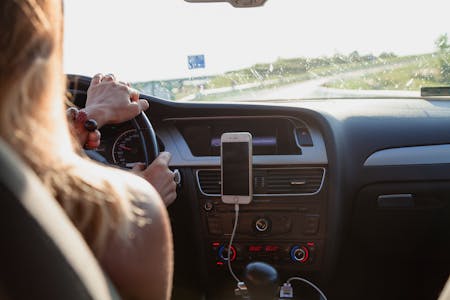

You can go to jail for driving without a license, especially if it’s a repeat offense or results in an accident causing injury or death. In Texas, a first-time offense usually results in a fine, but subsequent violations can lead to jail time of up to six months. If the unlicensed driver causes a serious accident, the penalties become even more severe. The attorneys at Goldenzweig Law Group, PLLC emphasize the importance of understanding your legal rights and potential consequences in these situations.
Driving without a valid driver’s license is a serious offense that can lead to significant legal trouble, financial penalties, and even jail time. It’s crucial to understand the law and the possible outcomes of not adhering to it.
This guide will help you grasp the gravity of driving without a license and what you can do to avoid or handle such situations.
Factoid About Unlicensed Driving
| Statistic | Value | Notes |
|---|---|---|
| Total Teen Drivers in the U.S. | 8.8 million | As of the latest statistics |
| Young Drivers Injured in Crashes (2020) | 189,950 | |
| Young Drivers in Fatal Crashes (2020) | 4,561 | |
| Teens Driving Without a License | 12% | |
| Decrease in Female Teen Driver Fatalities | 25% | Compared to previous years |
| Male Drivers Speeding in Fatal Crashes | 39% | |
| Teen Crash Fatalities Involving Alcohol | 852 (2020) | 29% had a BAC of 0.01 g/dL or higher |
| Crashes on Weekends (Fri-Sun) | 50% | Of teenage driving-related crashes |
Overview of Driving Without a License
Driving on public roads requires a valid driver’s license—a fundamental rule across the United States.
This license proves your understanding and capability to operate a vehicle safely. Not having a valid license not only questions your driving skill but also violates state laws.
Definition and Legal Considerations
A driver’s license is an official document permitting a specific individual to operate one or more types of motorized vehicles.
Driving without such a license is considered illegal and is subject to penalties. The law requires all drivers to have their license on them when driving.
Distinction Between Driving Without a License and Driving on a Suspended License
Driving without a license means you’ve never been issued a license or it’s not currently valid.
Driving on a suspended license, however, means your license was valid but has been temporarily withdrawn due to various reasons—like accumulating too many driving points or DUI charges.
The Legal Requirement for Having a Valid Driver’s License
Driving is a privilege that comes with significant responsibilities, one of which is the legal requirement to hold a valid driver’s license. This requirement is foundational to ensuring that all drivers on the road have met minimum safety and knowledge standards to operate a vehicle.
- Passing Written and Driving Tests
- Age Requirements:
- Proof of Identity and Residency
- Vision Test
- Paying Required Fees
- Renewal
Penalties for Driving Without a License
The consequences of driving without a license can vary widely, depending on the state where the violation occurs. However, the penalties often include fines, possible jail time, and other legal repercussions.
General Consequences Nationwide
Across the United States, driving without a valid license is considered a misdemeanor offense. This classification means you could face criminal charges, which may lead to a record that affects future employment, education, and other opportunities.
The general consequence is a fine, but the specifics can vary significantly by location.
Specific Penalties by State
Each state has its own set of laws and penalties for driving without a license.
For example, in some states, the fine might be a few hundred dollars, while in others, it can reach up to $1,000 or more.
Additionally, some states may impose jail time, especially for repeat offenses or if the lack of a license contributed to an accident.
Misdemeanor vs. Infraction Charges
Whether driving without a license is considered a misdemeanor or an infraction can also differ.
Infractions usually result in a fine and no criminal record, whereas misdemeanors can lead to jail time and a record.
The determination often depends on the driver’s history and the circumstances of the violation.
Financial Implications
The financial burden of driving without a valid license extends beyond just the initial fines. There are court costs, potential increases in insurance premiums, and other financial penalties that can significantly impact one’s budget. Understanding these financial implications is essential for all drivers.
Fines and Penalties
When caught driving without a license, the first financial hit comes in the form of fines. These fines can range significantly based on the state’s laws, previous offenses, and the circumstances of the incident.
For instance, a first-time offense might result in a fine of $200 to $500, but this amount can increase dramatically with subsequent offenses or if driving without a license results in an accident.
Court Costs and Additional Fees
In addition to fines, individuals may also be responsible for paying court costs and other fees associated with their case. These costs can add up, especially if the case is complex or prolonged.
Sometimes, there may be fees for reinstating a suspended license or for attending mandatory driving courses as part of the penalty.
Impact on Insurance Premiums
One of the long-term financial implications of driving without a license is the potential increase in car insurance premiums.
Insurance companies view driving without a license as a significant risk factor, which can lead to higher premiums for drivers even after they’ve reinstated their license. In some cases, insurers may refuse to provide coverage altogether.
Jail Time and Legal Consequences
The thought of facing jail time for driving without a license is daunting, but it’s a reality for some individuals, depending on the severity of the offense and state laws. Beyond immediate legal consequences, there are long-term implications that can affect one’s life significantly.
Circumstances Leading to Jail Time
Jail time for driving without a license typically occurs under specific circumstances—such as repeat offenses, involvement in an accident while driving without a license, or when the act is part of another criminal activity.
In some states, even a first-time offense can lead to jail time, emphasizing the seriousness with which this violation is treated.
Probation and Community Service Options
In lieu of, or in addition to, jail time, courts may impose probation or community service.
Probation can include regular check-ins with a probation officer and adherence to strict conditions set by the court.
Community service may involve working a set number of hours in service to the community, often in programs aimed at reinforcing the importance of lawful behavior.
Long-term Legal Implications
The long-term legal implications of driving without a license can extend far beyond jail time or community service.
A conviction may result in a criminal record, affecting employment opportunities, eligibility for certain professional licenses, and even housing options.
Moreover, the reinstatement of driving privileges can become more complicated, requiring additional steps and demonstrating responsibility to the satisfaction of the court.
State-Specific Laws and Penalties
Driving without a license is a universal offense in the United States, but the specific laws and penalties associated with this violation can vary significantly from one state to another.
Understanding these differences is crucial for drivers, especially those who might travel or relocate across state lines.
Variations in Laws by State
Each state has its own set of rules regarding driving without a license. For instance, some states may treat a first-time offense as a minor infraction, while others might classify it as a misdemeanor right away.
The criteria for these classifications often include the circumstances of the offense, such as whether it resulted in an accident or was part of repeated violations.
Examples of Penalties in High-profile States
In California, driving without a valid license can result in fines up to $1,000, potential jail time, and impoundment of the vehicle.
In contrast, Texas might impose fines up to $200 for a first offense, with penalties increasing for subsequent offenses.
This shows how penalties can widely differ, emphasizing the need for drivers to be familiar with the laws of the states in which they drive.
How State Laws Influence Punishment Severity
The severity of the punishment for driving without a license is directly influenced by state laws.
States with higher traffic volumes and more stringent safety campaigns may impose harsher penalties to deter violations.
Furthermore, states may consider factors like the presence of prior offenses or the driver’s age in determining the severity of the punishment.
Defense Strategies and Legal Representation
Facing charges for driving without a license can be daunting, but there are several defense strategies that may be employed to mitigate the situation.
Legal representation plays a crucial role in navigating these legal challenges, ensuring that your rights are protected and the best possible outcome is achieved.
Common Defense Strategies
There are a number of defense strategies that can be utilized, depending on the circumstances surrounding the offense.
For instance, if you were not actually driving at the time of the alleged offense, this could form the basis of a defense.
Another common strategy involves proving that you had a valid license at the time but were unable to present it—perhaps because it was lost or stolen.
Legal professionals can assess the specifics of your case to determine the most effective strategy.
The Role of a Defense Attorney
A defense attorney plays a crucial role in the legal system, especially for individuals facing charges such as driving without a license. Their experience are invaluable assets that can significantly influence the outcome of a case.
From providing legal advice to representing clients in court, a defense attorney ensures that their client’s rights are protected throughout the legal process.
- Assessment of the Case
- Legal Representation
- Negotiation with Prosecutors
- Guidance Through the Legal Process
- Support
Importance of Legal Support in Such Cases
Seeking legal support is critical when faced with charges of driving without a license.
An attorney can provide a comprehensive understanding of your legal options and the potential consequences of your actions.
They can also guide you through the process of reinstating your license and ensuring compliance with state laws going forward.
Need Legal Assistance? Contact Goldenzweig Law Today
If you’re in need of an auto accidents attorney in Houston or face charges for driving without a license, don’t face this challenging time alone.
Goldenzweig Law specializes in providing comprehensive support and representation. Call us at 713-903-3988 to discuss your case and learn how we can help secure the best possible outcome for you.
Navigation
Related Posts


What is a Non Dot Recordable Accident?
Continue Reading

